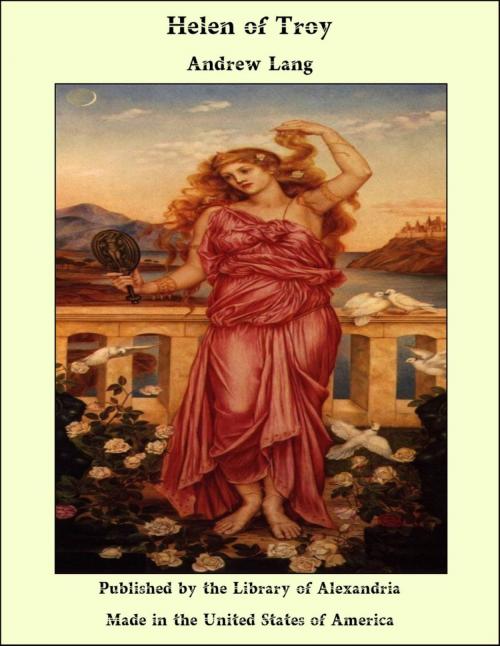| Author: | Andrew Lang | ISBN: | 9781465600868 |
| Publisher: | Library of Alexandria | Publication: | March 8, 2015 |
| Imprint: | Language: | English |
| Author: | Andrew Lang |
| ISBN: | 9781465600868 |
| Publisher: | Library of Alexandria |
| Publication: | March 8, 2015 |
| Imprint: | |
| Language: | English |
The character and history of Helen of Troy have been conceived of in very different ways by poets and mythologists. In attempting to trace the chief current of ancient traditions about Helen, we cannot really get further back than the Homeric poems, the Iliad and Odyssey. Philological conjecture may assure us that Helen, like most of the characters of old romance, is “merely the Dawn,” or Light, or some other bright being carried away by Paris, who represents Night, or Winter, or the Cloud, or some other power of darkness. Without discussing these ideas, it may be said that the Greek poets (at all events before allegorical explanations of mythology came in, about five hundred years before Christ) regarded Helen simply as a woman of wonderful beauty. Homer was not thinking of the Dawn, or the Cloud when he described Helen among the Elders on the Ilian walls, or repeated her lament over the dead body of Hector. The Homeric poems are our oldest literary documents about Helen, but it is probable enough that the poet has modified and purified more ancient traditions which still survive in various fragments of Greek legend. In Homer Helen is always the daughter of Zeus. Isocrates tells us (“Helena,” 211 b) that “while many of the demigods were children of Zeus, he thought the paternity of none of his daughters worth claiming, save that of Helen only.” In Homer, then, Helen is the daughter of Zeus, but Homer says nothing of the famous legend which makes Zeus assume the form of a swan to woo the mother of Helen. Unhomeric as this myth is, we may regard it as extremely ancient. Very similar tales of pursuit and metamorphosis, for amatory or other purposes, among the old legends of Wales, and in the “Arabian Nights,” as well as in the myths of Australians and Red Indians. Again, the belief that different families of mankind descend from animals, as from the Swan, or from gods in the shape of animals, is found in every quarter of the world, and among the rudest races. Many Australian natives of to-day claim descent, like the royal house of Sparta, from the Swan. The Greek myths hesitated as to whether Nemesis or Leda was the bride of the Swan. Homer only mentions Leda among “the wives and daughters of mighty men,” whose ghosts Odysseus beheld in Hades: “And I saw Leda, the famous bedfellow of Tyndareus, who bare to Tyndareus two sons, hardy of heart, Castor, tamer of steeds, and the boxer Polydeuces.” These heroes Helen, in the Iliad (iii. 238), describes as her mother’s sons. Thus, if Homer has any distinct view on the subject, he holds that Leda is the mother of Helen by Zeus, of the Dioscuri by Tyndareus.
The character and history of Helen of Troy have been conceived of in very different ways by poets and mythologists. In attempting to trace the chief current of ancient traditions about Helen, we cannot really get further back than the Homeric poems, the Iliad and Odyssey. Philological conjecture may assure us that Helen, like most of the characters of old romance, is “merely the Dawn,” or Light, or some other bright being carried away by Paris, who represents Night, or Winter, or the Cloud, or some other power of darkness. Without discussing these ideas, it may be said that the Greek poets (at all events before allegorical explanations of mythology came in, about five hundred years before Christ) regarded Helen simply as a woman of wonderful beauty. Homer was not thinking of the Dawn, or the Cloud when he described Helen among the Elders on the Ilian walls, or repeated her lament over the dead body of Hector. The Homeric poems are our oldest literary documents about Helen, but it is probable enough that the poet has modified and purified more ancient traditions which still survive in various fragments of Greek legend. In Homer Helen is always the daughter of Zeus. Isocrates tells us (“Helena,” 211 b) that “while many of the demigods were children of Zeus, he thought the paternity of none of his daughters worth claiming, save that of Helen only.” In Homer, then, Helen is the daughter of Zeus, but Homer says nothing of the famous legend which makes Zeus assume the form of a swan to woo the mother of Helen. Unhomeric as this myth is, we may regard it as extremely ancient. Very similar tales of pursuit and metamorphosis, for amatory or other purposes, among the old legends of Wales, and in the “Arabian Nights,” as well as in the myths of Australians and Red Indians. Again, the belief that different families of mankind descend from animals, as from the Swan, or from gods in the shape of animals, is found in every quarter of the world, and among the rudest races. Many Australian natives of to-day claim descent, like the royal house of Sparta, from the Swan. The Greek myths hesitated as to whether Nemesis or Leda was the bride of the Swan. Homer only mentions Leda among “the wives and daughters of mighty men,” whose ghosts Odysseus beheld in Hades: “And I saw Leda, the famous bedfellow of Tyndareus, who bare to Tyndareus two sons, hardy of heart, Castor, tamer of steeds, and the boxer Polydeuces.” These heroes Helen, in the Iliad (iii. 238), describes as her mother’s sons. Thus, if Homer has any distinct view on the subject, he holds that Leda is the mother of Helen by Zeus, of the Dioscuri by Tyndareus.















